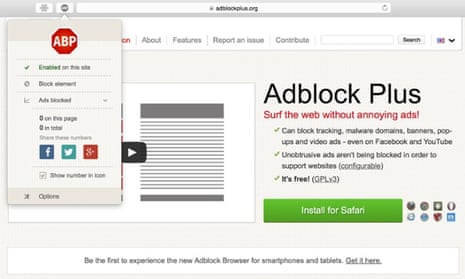The company behind popular ad blocking software AdBlock Plus has said it will set up an “independent board” to oversee its list of acceptable ads, less than a day after beating off a court challenge from German publisher Axel Springer.
Eyeo has been accused of holding publishers to ransom by charging to have ads served to users of its ad-blocking software. Eyeo, a German software company, says those advertisers who want to get on its so-called “whitelist” must abide by rules against annoying or intrusive ads, but until now has made the final decision on which ads should be allowed. About 70 companies are reportedly signed up, but their names have not been disclosed.
Eyeo has not provided details on who would sit on the board, but a spokesperson told the Guardian it wanted it to include representatives from advertising, publishing and the public.
Adblock Plus co-founder Till Faida said: “Users determined the original criteria and can object in our forum to whitelisting proposals, but since we were the only ad blocker to offer such a compromise we have taken on a large role in the day-to-day maintenance of the criteria,. We have been looking for a way to make the Acceptable Ads programme completely independent while also updating the criteria to evolve with changing forms of online advertising. An independent board solves both issues.”
Though the move could give the whitelisting a degree of independence, publishers and advertisers are likely to remain hostile to Eyeo’s approach. On Tuesday, Scott Cunningham, senior vice_president at the Internet Advertising Bureau, called ad blocking “highway robbery” and urged ad blockers to “play fair”.
Eyeo’s proposal follows its victory in a German court, which ruled against a claim from Bild publisher Axel Springer that the company’s business model breached laws on competition, copyright or market dominance.
It is the fourth such case the company has won in Germany this year following two cases brought in a Munich court by TV companies ProSiebenSat.1 and RTL Group which were thrown out in May and an earlier action by the publisher of newspapers Handelsblatt and Die Zeit.

Comments (…)
Sign in or create your Guardian account to join the discussion